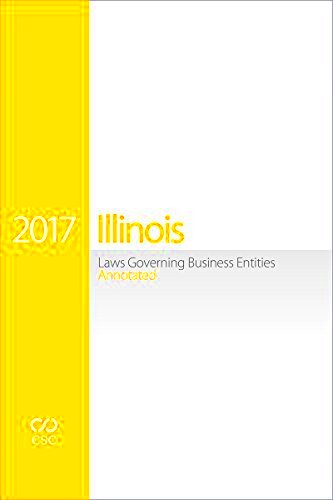Essential Information About Illinois Business Law
Illinois business law includes the rules of law and regulation that govern business formation, operation, and dissolution within the state. Whether you are an entrepreneur launching a new venture or an established firm seeking to expand, it is imperative to comprehend these laws. They ensure compliance with other laws and protect your rights as a businessman. We will discuss some elementary principles that every businessman ought to know in this section.
Types of Business Entities in Illinois

Selecting a correct organizational form is one of the primary actions that need to be taken when launching a new enterprise. Every single kind carries with it possible benefits, possible drawbacks and even some legal outcomes. The following are different types of business entities mostly found in Illinois:
- Sole Proprietorship: This is the simplest form of business, owned and operated by one individual. While it’s easy to set up, the owner is personally liable for debts.
- Partnership: In this structure, two or more individuals share ownership. Partnerships can be general (all partners share liability) or limited (some partners have limited liability).
- Limited Liability Company (LLC): An LLC combines the flexibility of a partnership with the liability protection of a corporation. Owners are protected from personal liability for business debts.
- Corporation: A corporation is a more complex structure, offering the strongest protection from personal liability. However, it requires more regulatory compliance and formalities.
- S Corporation: This is a special type of corporation that allows profits to be taxed at the shareholders’ level, avoiding double taxation.
Registration Requirements for Businesses

Before you can legally operate your enterprise in the state of Illinois, certain requirements regarding registration have to be met first. A simple breakdown is provided below:
- Choose a Business Name: Your business name should be unique and not infringe on existing trademarks. It’s a good idea to conduct a name search through the Illinois Secretary of State’s website.
- Register Your Business Entity: Depending on your chosen entity type, you’ll need to file the appropriate formation documents. For example, LLCs must file Articles of Organization, while corporations must file Articles of Incorporation.
- Obtain an Employer Identification Number (EIN): Most businesses require an EIN from the IRS, which is necessary for tax purposes and hiring employees.
- Register for State Taxes: Depending on your business type, you may need to register for various state taxes, including sales tax or employer taxes.
- Acquire Necessary Licenses and Permits: Depending on your business activities, you may need local, state, or federal licenses or permits. Check with local authorities for specific requirements.
Business owners can save time when launching their firms in Illinois if they know the rules because they will avoid future complications with the authorities.
Business Licenses and Permits in Illinois
In Illinois, the most critical thing for any business is getting important licenses and permits. These forms are more than simply pieces of paper; they serve as an assurance that your company adheres to local, state and federal laws. The kind of business you conduct dictates the exact licenses required, whereas neglecting this phase may result to penalties or shut down of your venture. Here is an analysis on what you need to understand about business permits and licenses in this state.
Below is a brief summary of the various licenses and permission types:
- Business License: Most businesses require a general business license to operate legally within a municipality. This can often be obtained from your local city or county clerk’s office.
- Professional Licenses: Certain professions, like doctors, lawyers, and real estate agents, require specialized licenses. Check with the Illinois Department of Financial and Professional Regulation to see if your profession is regulated.
- Health Permits: If you’re in the food service industry, you’ll need health permits. This typically involves passing health inspections to ensure safety standards are met.
- Environmental Permits: Businesses that impact the environment, like manufacturing or construction, may need permits related to waste disposal, air quality, and water use.
The particular prerequisites for your sector are a matter of utmost importance. The specific licenses and permits that a company needs may be gotten from many local chambers of commerce.
Regulations on Employment and Labor
For every business proprietor in Illinois, it is essential to comprehend employment and labor regulations. They protect the workers’ rights while stipulating employers’ obligations. Generally, understanding such laws will enable one to come up with an equitable workplace as well as keep it in line with legal demands.
Various notable laws must be taken into account, as follows:
- Minimum Wage: As of 2024, the minimum wage in Illinois is $15 per hour. Ensure your employees are paid at least this amount, as there are significant penalties for violations.
- Overtime Pay: Employees working over 40 hours in a week are generally entitled to overtime pay at one and a half times their regular rate.
- Worker’s Compensation: Illinois law requires employers to carry worker’s compensation insurance to cover medical expenses and lost wages for employees injured on the job.
- Anti-Discrimination Laws: The Illinois Human Rights Act prohibits discrimination based on race, gender, age, disability, and other characteristics. Familiarize yourself with these laws to foster an inclusive workplace.
Fostering a conducive working atmosphere can be achieved by obeying these principles, which will not only be legal but also enhance worker contentment and keep them for longer in their jobs.
Tax Obligations for Illinois Businesses
In Illinois, tax liabilities are significant for companies. It is advisable to know your tax dues and payment deadlines to elude fines and maintain a good reputation of your business. The following paragraphs highlight the primary tax obligations for all the companies based in Illinois.
A general overview of popular tax duties is given as follows:
- Income Tax: Corporations in Illinois are subject to a state income tax rate of 9.5%. Partnerships and sole proprietorships report income on personal tax returns.
- Sales Tax: If you sell goods or services, you must collect sales tax from customers. The state’s base sales tax rate is 6.25%, but local municipalities can add their own rates.
- Payroll Taxes: Employers are responsible for withholding federal and state income taxes, Social Security, and Medicare taxes from employee wages.
- Property Tax: If you own property, you’ll need to pay property taxes based on its assessed value. These taxes are typically collected by local governments.
Best seek professional tax advice as the Illinois tax law is complex and update with all deadlines and requirements.
Dispute Resolution Methods
In the business world, conflicts almost always arise. Regardless of whether it is a disagreement with a partner, an issue regarding a contract, or an argument with a client, understanding the best resolution practices is vital. In Illinois, there are numerous methods for disputing resolution, and they all have their own advantages and disadvantages. This article will discuss these methods to enable you select the most appropriate way out considering your circumstances.
The most common means of dispute resolution is as follows:
- Negotiation: This is the simplest and most informal method. It involves direct discussions between the parties involved, aiming to reach a mutually acceptable agreement. It’s cost-effective and can preserve business relationships.
- Mediation: In this method, a neutral third party (the mediator) helps facilitate discussions between the disputing parties. Mediation is non-binding, meaning that the mediator cannot impose a solution. It’s a good option for those looking for a more structured approach than negotiation.
- Arbitration: Arbitration involves a neutral third party (the arbitrator) who listens to both sides and makes a binding decision. This method is generally faster and less formal than court proceedings, making it a popular choice for many businesses.
- Lawsuits: If all else fails, taking the dispute to court may be necessary. This method can be lengthy and costly, but it may be the best way to enforce your rights or seek damages.
The best method for resolving any dispute will depend on the facts of your case. To make an informed choice, it is advisable to consult a lawyer.
Frequently Asked Questions about Illinois Business Law
The intricate nature of business law often leads to numerous inquiries from entrepreneurs about what they are allowed to do and what they ought to do. Typical issues regarding Illinois business law that may provide clarification on better understanding will be tackled as follows so you would not have any doubts.
1. What business licenses do I need to operate in Illinois?
The licenses needed are contingent upon the type of the business being run. The general business license is compulsory for most businesses from their local municipalities, but certain professions may require their additional licensing.
2. How do I choose the right business entity?
Things to think about include liability, tax, and how to manage it. Consulting an attorney can be useful in identifying what would best fit you.
3. What are my responsibilities as an employer?
All employers are mandated to follow certain laws about work such as the rules on the least amount of pay they should give their employees, extra money for the extra time spent by an employee doing something above what he or she was supposed to do at first and insurance that protects employees from accidents while at work. You need to know these laws well.
4. What should I do if I have a business dispute?
In case these strategies do not work, you might want to consider the possibility of arbitration or litigation in your case.
5. How do I handle taxes for my business?
In order to be well aware of your tax responsibilities such as income, sales and payroll taxes, it is advisable that you seek guidance from an expert in taxation.
Conclusion on Illinois Business Law
Illinois business law is must for whatever concerns starting or operating up a business there. This is because various aspects such as the kind of a business entity, tax obligations and dispute resolution will greatly influence how successful one becomes. One important thing to note is that staying compliant protects your company as well as instills confidence amongst its clients or staff members. You can get custom-made advice depending on your individual situation by contacting an attorney whenever you are unsure. The right knowledge combined with support will make your transition into the corporate realm easier.


